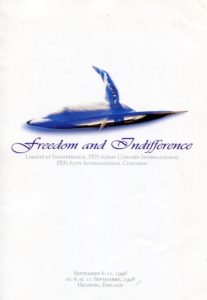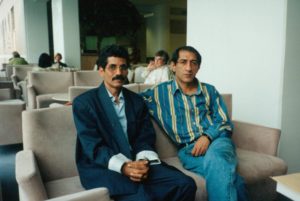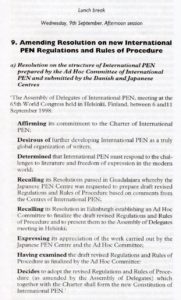Posts Tagged ‘Helsinki’
PEN Journey 21: Helsinki—PEN Reshapes Itself
PEN International celebrates its Centenary in 2021. I’ve been active in PEN for more than 30 years in various positions and now as an International Vice President Emeritus. With memories stirring and file drawers of documents and correspondence bulging, I am a bit of a walking archive and have been asked by PEN International to write down memories. I hope this personal PEN journey will be of interest.
In the old days, at least my old days, the Vice Presidents of PEN International sat in a phalanx on a stage while the Assembly of Delegates conducted business—revered writers, mostly white older men, along with the President, International Secretary and Treasurer of PEN in the center. If the Assembly business wore on, it was not unusual to see one or two of them nodding off. The role of the Vice Presidents was to provide continuity—many had been former PEN Presidents—to provide wisdom, contacts and gravitas. The designation was for life.
But times were changing. For instance, I had recently been elected a Vice President. I was a woman. I’d served PEN in several positions, including president of my center, founding board member of the International PEN Foundation and International Writers in Prison chair; I was a writer, though not of international renown, and at the time I was relatively young. I had been nominated by English PEN whose General Secretary thought it was high time more women sat on that stage. I didn’t relish sitting on a stage, but I was honored to hold the position. The Helsinki Congress in 1998 was the first when Vice President was the only role I had. I don’t recall if there was a stage at that Assembly. The fun was that I didn’t have to do anything. I could float between committee meetings, offer comments when relevant, wisdom if I had any and be called upon for whatever insight or experience or task might serve. (Traditionally the Congress organizers paid for the Vice Presidents’ registration and hotel, but from the start I chose to cover my expenses as a way of contributing to PEN. The expense of Vice Presidents attending was growing more and more difficult for the host centers; on the other hand many Vice Presidents wouldn’t be able to attend otherwise.)

Program for 65th PEN International Congress in Helsinki, Finland
At the 65th PEN Helsinki Congress held at the Marina Conference Center on the waterfront, a short walk from the city center, delegates and PEN members from 70 centers around the world gathered. The Congress’ theme was Freedom and Indifference. My memories are of meals on the water with colleagues, of eating fish and mussels and walking among old and very new buildings, visiting the architecturally stunning Contemporary Art Museum and other cultural excursions I often didn’t have time to attend when chairing the Writers in Prison Committee.
At the Congress I could even sit in on a few of the literary sessions which included abstract topics such as Where Does Indifference End and Tolerance Begin?—The Role of the Intellectual in Contemporary Society; Eurocentrism and the Global Village; The Cultural Gap Between East and West; The Ambivalence of Otherness: Identity and Difference; Crime Literature Portraying the Society; On Cultural Creolisation (mixture) and Borderlands. I confess reading those topics now stirs memories of sleepy academic afternoons, but the writers presenting included some of the engaged and engaging writers of the day, including Wole Soyinka, Caryl Phillips, Andrei Bitov and many Finnish and Scandinavian writers such as Sweden’s Agneta Pleijel.
At the Congress I still concentrated on the work of the Writers in Prison Committee which former Iranian prisoner Faraj Sarkohi attended. The year before he had been a main case for PEN, imprisoned and tortured and threatened with execution. In introducing his presence to the Assembly of Delegates, PEN President Homero Aridjis noted that PEN members could take satisfaction in having played an important role in obtaining his release. Sarkohi had managed to get a passport and was now living in Europe where he’d resumed his literary and journalistic activities.
Moris Farhi, the new WiPC Chair, introduced Sarkohi to the General Assembly of Delegates where Sarkohi said he owed his life and freedom to the international movement initiated by PEN both in the London headquarters and in the PEN centers around the world. For the first time in 20 years the Iranian government had been forced to release someone they had wanted to kill, he said. His release demonstrated to other writers in Iran that release was possible even if the government wanted to execute them. Sarkohi had briefly spoken with another PEN main case in prison who told him he was no longer worried, knowing now about the international support he was receiving.
Sarkohi explained that writers were considered by the despots in Tehran to be guilty because they worked with words, because they tried to discover and express in words different aspects of truth. It was believed writers made magic, he said. Everyone knew the magical power inherent in words so the writers were arrested. The government forced them to deny themselves, to accept false charges, and in this way they killed writers mentally. When a writer was forced by physical and mental torture to deny himself, his ideas and his work, his power of creation died, and he was killed as a writer. When Sarkohi was in solitary confinement, he remembered the way in which those suspected of magic were treated in the Middle Ages. People were arrested and burned and told “If you live, your magic powers are proved and we kill you. If you die, it is established that you do not have magic powers.’—but you were dead anyway. Writers were regarded as the new practitioners of magic in this century and that treatment by tyrants and despots was that of the Middle Ages.
Sarkohi described how he and colleagues who were still in prison had issued a new Charter, inspired by the PEN Charter, in which they protested censorship, both by the government, self-censorship and by the public such as groups which beat up a writer in the street. The Charter also demanded the right for writers to organize an association, something not permitted in Iran. He worried now about the fate of his colleagues in Iran because five years ago when writers published a Charter and sent the text abroad, the government had reacted and killed a famous translator and dumped his body in the street and murdered a famous poet in his home.
Sarkohi noted that German PEN and other PEN centers had prepared a resolution for the Congress making it clear to the Iranian government that International PEN was watching the fate of Iranian writers so they would know before they arrested or killed someone that Iranian writers were supported. He believed that support let all the world see that writers were not alone.

L to R: Mansur Rajih from Yemen, one of the first ICORN guests in subsequent years, and Iranian writer Faraj Sarkohi, former WiPC main case at PEN International’s 65th Congress in Helsinki, Finland, 1998
While the Helsinki Congress focused on the traditional work of PEN and its Committees, it was also a watershed Congress addressing the structure and governance of PEN. The Ad Hoc Committee, elected at the previous congress in Edinburgh (see PEN Journey 20), had examined the draft of revised Regulations and Rules and presented a final draft for the Assembly’s adoption. The revised Regulations and Rules were the product of two years’ work and consultations among centers. These were the first amendments to the Regulations of PEN since 1988 and the first major revision since 1979.
International PEN’s reform to provide more democratic decision-making, more communication between the International and the Centers and more transparency was not an entirely smooth transition and reflected a larger global trend at the time among the 100+ nationalities represented in PEN.
At the Congress a new International Secretary—Terry Carlbom from Swedish PEN—was elected as the only candidate, Peter Day, editor of PEN International magazine, having stepped down from consideration because of health reasons. The former International Secretary Alexandre Blokh, who had served for 16 years, didn’t attend the Congress, but was elected a Vice President and returned to subsequent Congresses.
Marian Botsford Fraser of PEN Canada, representing the Ad Hoc Committee, presented the new proposed Rules and Regulations, noting that they were “the nuts and bolts or the strings and hammers of a piano or the engine of a car or mother board of a computer. In any case their workings were unfamiliar to most writers,” she said. “It was as if we had been asked to rebuild the engine of a 1979 Audi, a vehicle renowned for the complexity of its construction. Frankly I can think of only one more difficult assignment for nine writers and that would have been to collaborate on the writing of a novel.”
She noted that the Committee of nine was a diverse collection of individuals with the wisdom that democracy sometimes magically bestowed upon its practitioners. The Edinburgh Assembly had chosen a group of people who represented the linguistic, cultural and geographic diversity of PEN and who brought to the table individually and collectively their commitment to the history and the future of PEN, their desire to remain true to the spirit of the Charter of PEN and to the identity of PEN as first and foremost an organization of writers working together to protect language, literature and the fundamental human right of freedom of expression. “We brought to the process different and strongly held views on how to make the regulations that we were charged with drafting embody those principles, how to create a structure that would become the foundation for the future of this organization,” she said.
She thanked certain Ad Hoc members, who in fact did seem to have some knowledge of the workings of a 1979 Audi and added special thanks to Administrative Director Jane Spender “who took the whole mess of scribbled bits of paper, half sentences, cryptic clauses, clearly articulated ideas and sometimes incoherent good intentions back to London, and through another process of consultation and discussion and writing and rewriting was able to turn all of this into two documents that were sent to all Centers as Draft Regulations and Rules.” Homero Aridjis, the new International PEN President, also participated in this task along with the Ad Hoc Committee.
As I read through the minutes of the Helsinki Assembly, I recalled the tensions that arose, particularly around single words such as “a-political”—after all we were an organization of writers where words and translation of words mattered—and around events that had happened off stage. Changing the way a 77-year old organization worked was perhaps more like shifting from an Audi into an SUV which could hold more people, handle more difficult terrain but also consumed more fuel and energy. But metaphors aside, after debate and discussion, agreement was ultimately achieved.
The most important change was the move to form an Executive Committee that would be the main implementing body for International PEN, a step agreed by most all Centers who chose to participate in the process. Instead of government by a small executive of the President, International Secretary and Treasurer between the Assembly of Delegates’ meetings, an Executive Committee of seven members drawn from the centers around the globe and elected for three-year terms (and up to six years) would operate along with the three executives of PEN. The election for the first Executive Committee was to take place at the 1999 Congress in Warsaw. Until then the Ad Hoc Committee would continue to function and also act as a Selection Committee to assure qualified candidates were put forward.
Details of this new structure were modified over the next twenty years. The Selection Committee evolved into an elected Search Committee to assure qualified candidates were proposed for the various offices and to gather their required papers. The Search Committee was not set up to be a guardian council or an arbiter of candidates, but a facilitator for the process. In 2005 an Executive Director was added to the equation. As with any organization, PEN keeps growing and changing, but the essential structure to broaden and democratize governance of this global organization was set in place in 1998 in Helsinki. I’m not sure what vehicle I would compare PEN to these days, probably not a finely tuned Audi, but it continues to drive.
As for Vice Presidents, that office was not changed during this watershed period of reform, but over time, PEN changed the role of Vice Presidents and designated the ex-Presidents as Presidents Emeritus instead and divided the Vice Presidents into two equal categories with twelve in each: those elected for “service to PEN” and those designated for “service to literature;” the later included internationally renowned writers and Nobel laureates such as Nadine Gordimer, Toni Morrison, Svetlana Alexievich, Orhan Pamuk, Margaret Atwood, Ngũgĩ wa Thiong’o, J.M. Coetzee.
When I became International Secretary (2004-2007), the Executive Committee (now called the Board) and I proposed, and the Assembly agreed, that Vice Presidents’ terms should be limited, at least in the category of service to PEN—ten years or sometimes twenty—then most would move to emeritus status. It took another ten years before this change was implemented.
These are arcane details but illustrate PEN as an organization striving to keep those experienced engaged at the same time keep the organization unencumbered so it can grow and bring in new ideas and talent. It is a vehicle constantly re-tooling with the Charter as its base and a body of creative members whose greatest talents are not necessarily in rules and regulations yet who respect their necessity. Vice Presidents Emeritus, as I now am, are invited to the Congresses and show up and are still sought out for the bit of history we know and for the bits of wisdom we might offer from our experience and for continuity. We knew PEN in the days of the Audi, though even then it was perhaps not so finely tuned, I think, but it got from here to there across the globe as it still does.
Next Installment: PEN Journey 22: Warsaw—Farewell to the 20th Century
